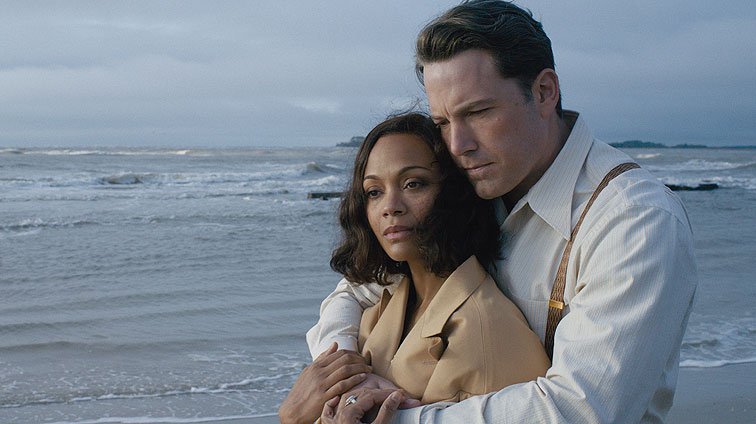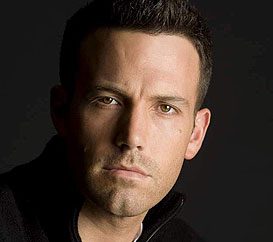
His Way
Ben Affleck honors the classics while still forging into uncharted territory in Live by Night, a gangster tale about the price of making your own rules.
 Ben Affleck
Ben Affleck
I feel like there’s some excellent writing out there…you see extraordinary writing, and you’re always going to find examples of popcorn writing that’s got a different agenda and wants to do something different. There's room for both.
With his new film, Live by Night, which he directs, stars in, and adapts for the screen from a Dennis Lehane novel, Ben Affleck wanted to pay homage to the seminal Warner Bros. gangster pictures of the 1930s and ‘40s like Little Caesar, The Public Enemy and Angels with Dirty Faces. But he also sought to conjure the more luxuriantly unwinding cinema epics of the ‘70s while still appealing to frenetic modern sensibilities.
It’s a disparate, difficult trio of elements to combine, which is apt for Affleck.
He has said repeatedly that the film’s central theme is the price of living life on your own terms. This ethos speaks to Affleck, who likes to do things his way. Looking at his substantial resume, one could conclude that it’s when the multi-faceted filmmaker takes the most creative control that he’s at his best. From his odds-defying, career-making debut in Good Will Hunting to the Writers Guild Award-nommed crime drama The Town, his Best Picture-winning Argo, and first acclaimed Lehane adaptation Gone Baby Gone, Affleck is most successful when pushing himself to his artistic limits.
With Night, he’s adapting a familiar voice in Lehane, telling the tale of a cop’s son who returns from World War I and gets sucked into a life of organized crime that takes him from Boston to Tampa and Cuba.
Affleck spoke with the Writers Guild of America West website about how, in addition to being drawn to Lehane’s energetic, cinematic writing style, he was excited to tell a gangster story in the wild, largely up-for-grabs territory of Florida, his love for ‘70s cinema, and how he assesses the health of film writing today.
You’ve worked in Dennis Lehane’s world a bunch. What appealed to you about this novel?
What appealed to me about this novel is the same thing that appealed to me about Gone Baby Gone, which is that it had really punchy, sexy, kind of crackling characters and really good dialogue and a very powerful story engine that I could appropriate and put into this script, that could keep the movie going. Dennis writes in a very cinematic way—it’s easy to visualize when you read his stuff, what something might look like as a movie. That’s what attracted me.
How much adapting did you have to do? I know you cut the big prison scene and the part that Joe’s police chief dad was on the take. How much did you have to do for structural, pacing reasons, and how much of it was for narrative thrust?
It was both. It was narrative thrust, but it was also just plain length. You can’t have a three-and-a-half hour movie, you’ll just wear the audience out. I had to pick and choose which parts I thought were most salient to the plot and which were the most effective, and which I thought were the most powerful. The prison scene was the one aspect of it I kind of felt, I’ve seen this before in prison movies, so I didn’t think we would miss much from that.
At the end of the day, what, thematically, is this story about for you?
I feel like it’s about the price of living life on your own terms.
Which is pretty costly, apparently?
Apparently.
You’ve talked about wanting to have a classic ‘70s feel with this film—not a lot of cutting, but you also wanted modern energy. At the writing stage, did you have to address that in the script at all?
Well, I could be more patient in the writing stage and let scenes run a little longer. Conventionally now, if you see a scene that lasts longer than two pages, that’s a long scene; it used to be five, six, seven, eight page scenes were the norm. So I allowed myself a little more breadth to write, to give myself a little more room and permission to not have to obey the current super-cutty aesthetic...
At the outset [in the scripting stage], how did you want to grapple with the fact that you’re making a gangster movie, something that’s been done a lot.
Well, I wanted to make something that was an homage to the great gangster movies of old and was also sort of a love letter to classic ‘70s epics that I really loved and find a way to fuse that and yet still view it through a contemporary lens, because obviously film grammar has changed, and you can’t do it just like they used to do it. You have to have the influence of that style of film, but then you also have to be mindful of modern audiences’ sensibilities.
And their diminishing attention spans?
Yeah.
When you talk about ‘70s flicks that were inspirational to you in this realm, what movies would you cite?
Oh, there’s a whole range, movies that had that sweep and scope and extras and costumes and design, which was the magic—from Doctor Zhivago to Reds and everything in between.
There’s another cool juxtaposition here—you’ve got the Depression-era metropolis of Boston and then you’ve got the sunny, multicultural new world of Tampa. What interested you about that?
What was interesting to me is I hadn’t seen gangsters in Tampa before. I’ve seen gangsters in Boston and New York and even Baltimore, but I hadn’t seen them go down south to this untamed country, seeing these immigrants competing for blocks of power and space. I thought that was actually kind of contemporary.
That’s a story that hasn’t been told—it’s like a Southern Western. How did you want to address Southern culture?
Well, Southern culture was more firmly established in states like Mississippi and Alabama. In Florida, it was still being carved up—you had your white Protestant culture that was there first, but you had a lot of competing groups vying for power and contributing to the culture, whether it was Cubans or Spaniards or Puerto Ricans or Dominicans or Italians or Irish. You had this kind of melting pot of people who were contributing to the spirit of the place. That was different than classic white Southern storytelling.
When, where, and how do you write, and how much has it changed? What's your ritual or your vibe?
I think a lot. I spend a lot of time thinking and mulling things over and wandering around and pacing and sort of figuring it out. By the time I sit down and write, it all sort of pours out because I've got it figured out. But I take a lot of time where it looks like I’m not doing anything at all.
A lot of people say that. So when it gets down to actually sitting in front of a computer, you’re more just putting it down?
Yeah, I’m knocking it out from what I've already come up with.
How much do you outline?
Some. On this one I did scenes, cards for scenes. I did a board, and I put the scenes up on the board, and then I looked at the board and studied the board and swapped things around, took things out and moved things around. Finally, I had a board that I liked and I just wrote from that.
You wrote straight from the block scenes on the board?
Exactly.
And you showed this to Dennis?
Yes.
Did he help at all—giving you his take?
He was just really nice. He loved the movie, and he was really complimentary, and that felt great.
In terms of writing, do you prefer to write solo?
No, I actually like writing with a partner because you get to bounce stuff off them. I’m working on The Batman script now with Geoff Johns, and that’s really a lot of fun. It’s fun to go back and forth with somebody and have someone to give you feedback.
So if you had a preference, you would work with someone?
Someone who I respected and who I thought was very talented. I've been really lucky with Matt [Damon] and Aaron [Stockard, The Town] and Geoff. I've had great partners.
You’re an interesting entity in that you’re a blockbuster man, and you’re an indie man, and you’re a ‘70s fan. From a screenwriting standpoint, how do you feel about the health of film writing these days?
Oh, I wouldn’t want to make a sweeping judgment like that. I feel like there’s some excellent writing out there. If you look at Moonlight or Manchester by the Sea, movies like that, you see extraordinary writing, and you’re always going to find examples of popcorn writing that’s got a different agenda and wants to do something different. There's room for both.
© 2017 Writers Guild of America West
